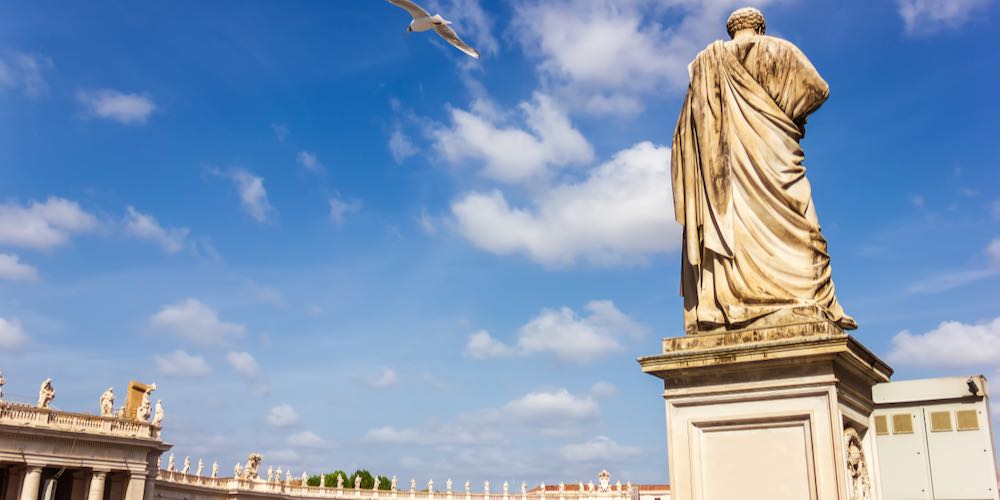Is Nationalism really a unique construction of Protestant theology as Yoram Hazony claims?
Illiberal Integralist Elites
Integralism is a tradition of thought that, aside from “rejecting the liberal separation of politics from concern with the end of human life,” struggles mightily to define itself. Beyond this one point, it is extremely unclear what it means to be an integralist. This is not to say that individual integralists do not have in mind any policies they would endorse on the basis of their integralist principles. Rather, the generic characterization of integralism itself, as nothing more than a commitment to the ideal that “political rule must order man to his final goal,” leaves the integralist ideal underspecified.
Integralists have some very generic commitments to the claims that the state should pursue the common good, that it cannot isolate religious or moral considerations from its pursuit thereof, and that it should do so in a way that conforms to Catholic teaching. However, many critics like myself still want to get clear on what it is that unites integralists around a political theory. The debates over integralism raise many questions, some of which are interesting in themselves. But their ideas about political authority are deeply problematic and make genial discussion of other points difficult or impossible. Integralism is deeply in tension with traditional natural law conceptions of political authority, and in what follows, I will explain why this is so.
“Integralism” is rather new in Catholic terms. The political identification arose in the nineteenth century as an understandable reaction to quick and disastrous attempts to abandon Catholic heritage in countries like France. As well-grounded a political thinker as Jacques Maritain was involved for a time. However, the movement morphed from its roots into something darker, especially in places, such as Spain, where it took on features of anti-Semitism (Félix Sardà y Salvany), or in Brazil, where integralists were allies of Nazism. The Church disassociated itself from the movement at various times. Integralists today aim to avoid these darker sides of their history, walking a fine line between presenting their theory as nothing more than Catholic social teaching, and proposing a substantive political ideal that aims to hearken back to Christendom, a “dyarchy” where Church and State are inseparable.
The integralist camp is clear in accepting general moral principles provided by Catholic social teaching: that the Church ought to be soul to the civic political body of the State; that government ought to conform to the objective moral law and to recognize “man’s origin and destiny in God” and so to “measure [political] judgments and decisions against this inspired truth about God and man”; that “government is also to help create conditions favorable to the fostering of religious life”; that “freedom which refused to be bound to the truth would fall into arbitrariness and end up submitting itself to the vilest of passions, to the point of self-destruction.” But these principles are not substantive at all in terms of providing any political program for an ideal of Church-State cooperation, aside from ruling out some versions of anarchism or extreme libertarianism.
Thomas Pink, a professor at King’s College, is primarily concerned with infringements of religious freedom in the contemporary world and the rise of hostile secularism. In essence, he believes that a confessional Catholic state is necessary to preserve the rights of the Catholic faithful to practice their faith. As he sees it, any attempts at State protection of religious freedom which do not acknowledge the positive value of religious truth (and adhere to one religion in particular) are bound inevitably to fail. And religious freedom, on Catholic doctrine, involves the supernatural good that is the most supremely good of all: eternal beatitude.
Thus, on Pink’s analysis, one must either form a confessional state or fail to protect the most important human right. Yet, freedom for the Church to pursue its mission is an important goal not only for integralists, but for all sane Catholics, and many non-Catholics. There are other alternatives to a confessional state in which canon law directly impacts civil law (the integralist ideal). Nevertheless, what is more important is that rights are correlative with duties. Even if the Church did have an abstract right to impose its canon law on civil society under a confessional regime, that right would be limited by its duties to promote the supernatural good in keeping with natural justice.
Integralists, however, question whether (or even deny) there are any such defeating considerations in light of the great dangers posed by secularism within the contemporary world. They are certainly reluctant to grant that any great goods may be achieved through a liberal society. What integralists want, therefore, is not merely a confessional state. Integralists have proposed a number of different policies, many of which are obviously attempts at religious control: blasphemy laws, prohibiting higher office or full political participation (e.g. limiting franchise or citizenship) for non-Catholics, restricting public proselytism and the building of synagogues or temples by members of non-Catholic religions, state censorship of morally or religiously erroneous speech or writing. But their recommendations also extend to measures having nothing specifically to do with religion: abortion and other culture war issues, the financial system, urban design, sponsorship of classical art, environmentalism, immigration reform, constitutional monarchy, and so forth. What unites all these proposals?
In natural law theory, facts about the common good supervene upon facts about basic goods for human beings (which all can know), but the integralist holds that only those with faith can truly understand the common good.
Integralists disclaim any need to agree about any specific political proposals as a matter of political prudence, but this is revealing in a certain important way about the aims of the movement. Those substantive points of consensus that all integralists agree upon are almost entirely underspecified when it comes to any particular implication for political action. Except for one thing: that the very fact these abstractions would be good for us is enough by itself to make it right to implement them.
People often confuse natural law justifications of policies with those proposed by integralists. Both appeal to the common good as that ultimate justifying reason for doing anything in politics. Nevertheless, integralism stands in opposition to the natural law account of political justification. Natural lawyers hold that the fact that a policy is good for our country is enough by itself to make it reasonable for us to implement that policy, not that this necessarily makes it right to do so. The rationale for this difference is that a natural law account holds that there are naturally knowable or self-evident basic goods, which are universally accessible to all citizens and constitute the basic reasons anyone does anything, including in politics. Integralism builds its account, by contrast, on facts that are not naturally knowable in this way, but that rest instead on claims that certain persons (Catholics) are more capable of perceiving what is in the common interest than others.
Integralist theorists such as Edmund Waldstein tend to emphasize that political prudence is a necessary prerequisite for engaging in political activity, because only the truly virtuous are reliable reasoners about what is in the common interest of their country: “the politician who has the care of [the common good] must himself be good—since he leads both himself and others to participate in it. He must have true virtue, directed to God as the ultimate final end.” Since there are supremely valuable supernatural goods known to exist only by faith (union with God by grace), only those with faith could even be minimally qualified to perceive and act upon what is really in the common interest. In natural law theory, facts about the common good supervene upon facts about basic goods for human beings (which all can know), but the integralist holds that only those with faith can truly understand the common good. Non-Catholics are simply unaware of the facts about what is in the common interest and incapable of acting upon it insofar as it is supernatural.
The religious trappings are unnecessary, however, as the basic move is well-known as an illiberal picture of political legitimacy: only a sub-set of actual citizens are reliable reasoners about what is in the common interest, and so only such a subset is relevant to the justification of public policies. Call this subset “the experts.” This illiberal principle about justification is easily confused with the view that some persons are more capable public administrators or reasoners than others.
Nobody disputes that some persons have capacities that make them well-suited to being in charge. In many cases, smarter or more capable persons ought to occupy offices requiring those skills. Clearly, too, more knowledgeable citizens are in possession of facts that are inaccessible to others, as experts know facts not easily knowable to other members of the public. What sets integralism apart is that, on this view, the experts are the only ones whose views are relevant for the justification of public policies: the fact that the experts judge a policy ought to be done is what makes it right (not just reasonable) for others to do it. Since it is right, others thereby have duties to obey and implement that policy merely because the expert says it ought to be.
If it is in fact true that political authority consists in being an expert, citizens who are not experts are simply not responsible political agents. Consequently, as the experts are the only relevant political agents, they can and ought to act for the others without their consent, even to the point of using coercive laws or policies for their benefit, over their objections. This sort of expert can properly coerce non-experts just as parents, by virtue of being more capable than their children, are empowered to make decisions for them. Anything in the way of experts promoting the common good (as they see it) counts as an unjust or at least regrettable hindrance.
Integralism generates a familiar picture of government: government that substitutes for the people, putting experts in charge who are appropriately enlightened and will more consistently act in the best interests of the benighted. Unlike integralist theorists, who generally stay in the realm of ideal theory and identify hostile secularity as their primary target (Pink, Waldstein), integralist “strategists,” like Adrian Vermeule, Sohrab Ahmari, Chad Pecknold, Patrick Deneen, or Gladden Pappin draw out the illiberal implications. They critique the malleability of democratic citizens and their tendency to be misled or easily manipulated in acting contrary to their interests—politics is upstream of culture—and so instead justify policies by appeal to whatever is supposedly in those citizens’ best real interest, even if those citizens would reject these policies.
I suggest, in conclusion, that debates over integralism should re-focus entirely on the illiberal view of political legitimacy. Prudent Catholics need to be clear that we cannot discuss other facets of integralism until the authority question is clear. No serious participant in the conversation disputes union with God in grace as the end of human life. Nobody seriously thinks that hostile secularity is the ideal state of government, or rejects the claim that society should order us toward the truth or the good. What we cannot do, however, is wink at the authoritarian and illiberal claims about authority that are implicitly, or sometimes explicitly, made in some integralist arguments. The underlying principle of legitimacy presupposed implicitly by the integralist is serious business. And that illiberal principle of legitimacy can be shorn of all religious trappings to get as clear as possible about its justification and its implications for governmental policy.
The good news is that victory is assured. However much they assure us that the experts are acting for the common good, from the moment they tell us (in the voice of Nurse Ratched), “…and we don’t care what you think about it,” we recognize the true aim of the elites consists in demeaning and infantilizing others. Illiberal elitism is also deeply incoherent as a theory on which political authority exists for promoting the common good. Recognizing who is an expert is itself a coordination problem that group reasoning aims to resolve. Even if there were spontaneous recognition by all relevant citizens that a certain person is an expert, this alone would not constitute that person as authorized to make decisions for the group. There are often other factors that might influence a reasonable decision to select someone else.
Precisely because politics is an art of applying prudence to a situation, we rightly and reasonably can disagree about who is suited to lead us. In that sense, there is plausibly no unique a priori correct answer to the question of whom one should select as political leader. Even if citizens all shared evaluative standards, each citizen might give weight to some qualities over others. The illiberal theory lands us, more profoundly, in an infinite regress for determining who counts as a holder of political authority. If only experts can recognize experts, the principle quickly devolves into ‘might makes right’ where the expert is the person holding the gun. Only startling naivete or worse can justify holding this theory after the horrors these views caused in the last century.
The debate about integralism is not a religious debate. The questions are instead quite simple: can the experts do no wrong? If we grant the experts can do wrong, are the rest of the citizens so utterly incapable of acting responsibly that the experts must take charge?
The answer to this latter question does, nevertheless, admit of theological clarification. The triumphant kingdom of Christ will be one (we believe) in which there is no Gentile or Jew, no male or female, no social discrimination of any kind, and no experts. If Christ is our King, we have duties to protect our fellow men from abuse of power (even by experts, real or purported). The King will reply, “Truly I tell you, whatever you did for one of the least of these brothers and sisters of mine, you did for me.” (Matt. 25:40).



